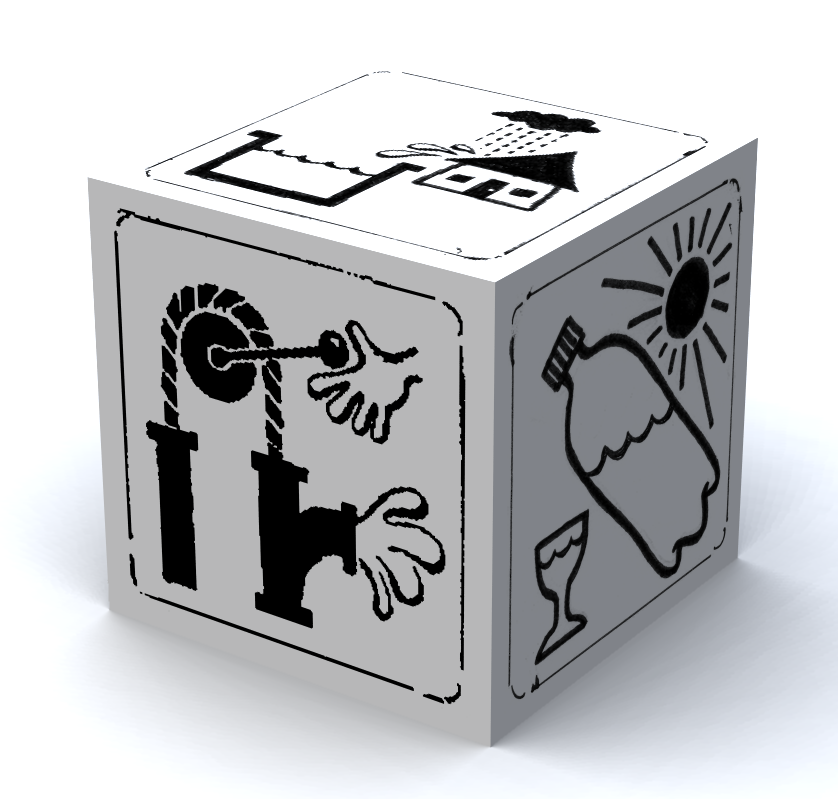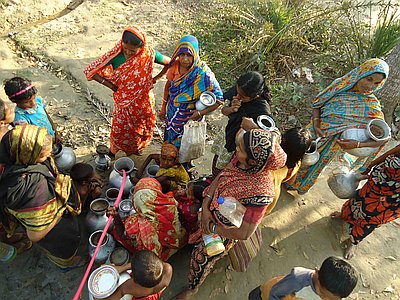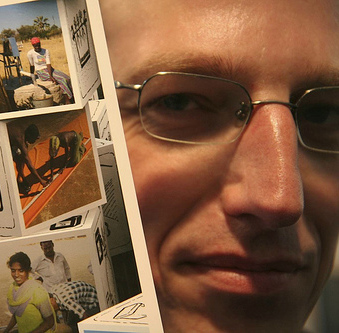|
|
| Line 70: |
Line 70: |
| | |* '''Sanitation First''': 2.6 billion people in the world don't have access to a toilet. The reality of what this means may be hard for us lucky toilet-owners to imagine, so here's an [http://youtu.be/P6wkjWxEbKY animation] to help. | | |* '''Sanitation First''': 2.6 billion people in the world don't have access to a toilet. The reality of what this means may be hard for us lucky toilet-owners to imagine, so here's an [http://youtu.be/P6wkjWxEbKY animation] to help. |
| | | | |
| − | |* NEW ARTICLE: [[Biogas-fueled_pump|'''Biogas-fueled pump''']] - Using biogas for pumps in irrigation is gaining in popularity in India and elsewhere, as the savings in petroleum fuel prices are great. A diesel pump can also be converted into a bio-gas pump used for pumping water. The cheapest way to get biogas, once a pump is obtained, is to build a biomass digester, which means biomass must be collected, cultivated, or found.
| + | * NEW ARTICLE: [[Biogas-fueled_pump|'''Biogas-fueled pump''']] - Using biogas for pumps in irrigation is gaining in popularity in India and elsewhere, as the savings in petroleum fuel prices are great. A diesel pump can also be converted into a bio-gas pump used for pumping water. The cheapest way to get biogas, once a pump is obtained, is to build a biomass digester, which means biomass must be collected, cultivated, or found. |
| | | | |
| − | |* NEW ARTICLE: [[Solar_water_heater_tank|'''Solar water heater tank''']] - A solar water heater is any system that uses the thermal energy of the sun to heat water. They are usually aimed at heating water to a temperature hot enough for washing clothes, washing dishes, and personal hygiene, but not hot enough to cook with straight away. However, as long as it is clean, the hot water can also be used in cooking to save time and fuel.
| + | * NEW ARTICLE: [[Solar_water_heater_tank|'''Solar water heater tank''']] - A solar water heater is any system that uses the thermal energy of the sun to heat water. They are usually aimed at heating water to a temperature hot enough for washing clothes, washing dishes, and personal hygiene, but not hot enough to cook with straight away. However, as long as it is clean, the hot water can also be used in cooking to save time and fuel. |
| | | | |
| | |- | | |- |
Welcome, Bienvenue, Bienvenido to Akvopedia!
|
|
Welcome to Akvopedia, the open water and sanitation resource that anyone can edit. The goal of Akvopedia is to improve water and sanitation projects through knowledge exchange on smart and affordable technical solutions and effective approaches. Akvopedia now contains 2,211 articles in English. In the coming months, two new portals called Emergency and Sustainability will be developed, and the current Finance portal will be fully updated and extended.
Water Studio
|
| The Water Studio contains information on water collection, pumping and transportation, storage, treatment, and use of water.
|
Sanitation Studio
|
| The Sanitation Studio contains information on toilets, collection, transportation, treatment, use of products, and hygiene.
|
Approaches Studio
|
| The Approaches Studio contains information on product development, service delivery, finance, promotion, and support systems.
|
|
What's happening now
|
Project: Sujol's first village test - Kalaroa.
Introducing Voltea CapDI technology to eliminate arsenic from water supply.
- - 3 water systems
- - 30,000 people affected
- - 10 years duration
Location: Asia, Bangladesh, Kalaroa
22.858314, 89.039436
One of three test locations that will for the first time assess the viability of Voltea CapDI technology as a sustainable solution to contaminated water, for impoverished communities in Bangladesh. Developed by Voltea, a Unilever Ventures company, CapDI is an innovative, low energy, non-chemical breakthrough that can treat arsenic contaminated water in an affordable and effective way. The testing will span a period of 18 months. How Voltea CapDI works.
|
More news
|
* Sanitation First: 2.6 billion people in the world don't have access to a toilet. The reality of what this means may be hard for us lucky toilet-owners to imagine, so here's an animation to help.
- NEW ARTICLE: Biogas-fueled pump - Using biogas for pumps in irrigation is gaining in popularity in India and elsewhere, as the savings in petroleum fuel prices are great. A diesel pump can also be converted into a bio-gas pump used for pumping water. The cheapest way to get biogas, once a pump is obtained, is to build a biomass digester, which means biomass must be collected, cultivated, or found.
- NEW ARTICLE: Solar water heater tank - A solar water heater is any system that uses the thermal energy of the sun to heat water. They are usually aimed at heating water to a temperature hot enough for washing clothes, washing dishes, and personal hygiene, but not hot enough to cook with straight away. However, as long as it is clean, the hot water can also be used in cooking to save time and fuel.
|
Contributing to Akvopedia
|
| Share your news and knowledge on water and sanitation by contributing articles to the Akvopedia. We've used the same conventions as the well-known online resource Wikipedia, so adding and editing articles is quick and easy to learn. This graphical guide will get you started; more detailed information about editing wiki articles is available in the help pages: Help:Contents
Mailing list - Participate in the Akvopedia mailing list. The Akvopedia mailing list is open to anyone who wants to discuss or follow the content work we are doing on the Akvopedia. Contact us to be added to the list.
To get an edit account, please send an email to m.t.westra [at] akvo.org.
|
Editorial support
|
|
Do you have good content that you would like to contribute, but you lack the time or the resources? Would you like to propose a new item, or do you need help with putting content in the pages? Akvopedia offers free editorial services, provided by our editor Mark Tiele Westra. Please contact him at m.t.westra akvo.org. akvo.org.
|
|
|
|



